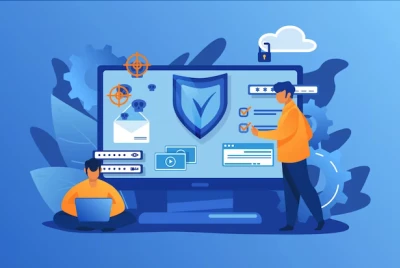
Cloud computing is a vital part of today's Internet-based world. It drives innovation and provides scalable solutions. Cloud technologies such as disaster recovery solutions, encryption, and backup strategies are crucial in protecting sensitive data and ensuring business continuity amidst today's advanced and evolving Linux security threats.
In this article, we'll examine cloud-based technologies transforming Linux security, their advantages, and the central role of AI and automation in modern cloud security.
The Power of Linux Cloud Backup Solutions
Cloud computing has revolutionized the way businesses approach data backup. The cost of onsite storage for data backup is high, and cloud storage allows organizations to store data remotely and access it from anywhere.
Cloud services provide automated backup solutions, reducing human error and creating a seamless process for backing up critical data. Cloud technology allows businesses to ensure that their data is always backed up, even in the case of a cyberattack or hardware failure.
Cloud Technologies for Data Encryption
 It's no secret that data encryption is a foundational element of modern cybersecurity. To protect sensitive data, admins and organizations must use advanced encryption tools to protect information in transit and at rest.
It's no secret that data encryption is a foundational element of modern cybersecurity. To protect sensitive data, admins and organizations must use advanced encryption tools to protect information in transit and at rest.
Cloud providers offer encryption services that allow users to encrypt their data before uploading it to the cloud. If an unauthorized server hack occurs, the data is then rendered unreadable. Combining advanced algorithms with constantly updated platforms strengthens encryption and ensures compliance with international standards.
Ensuring Business Continuity with Cloud-Based Disaster Recover
Cloud computing has changed the way organizations tackle disaster recovery and business continuity. It was once time-consuming for companies to maintain offsite backup and recovery systems. Cloud disaster recovery solves this issue by restoring operations more quickly and efficiently after an event such as a cyberattack or natural disaster.
Cloud technology allows businesses to mirror critical data and systems on cloud servers in real-time, allowing operations to start immediately with minimal downtime. Cloud disaster recovery can be scaled up to accommodate large enterprises and small businesses. This enables them to use enterprise-class software without investing heavily in infrastructure. Cloud-based systems are recoverable from disasters, reduce the impact on day-to-day operations, and ensure business continuity.
The Role of Artificial Intelligence & Automation in Cloud Security
Cloud-based security strategies are becoming increasingly reliant on Artificial Intelligence and automation. These AI technologies can analyze large volumes of data in real-time, providing definite insights about anomalies and possible threats before any damage has been done. Integrating AI and cloud security platforms can yield proactive defense mechanisms that detect and mitigate threats automatically.
Cloud-based security strategies increasingly rely on Artificial Intelligence and automation, often as critical components of CSPM. These AI technologies can analyze large volumes of data in real-time, providing definite insights about anomalies and possible threats before any damage has been done. Integrating AI and cloud security platforms can yield proactive defense mechanisms that detect and mitigate threats automatically within a CSPM framework.
Automation is a natural step in cloud security, as mundane tasks such as monitoring, patching, and updating systems are frequently repeated. Automated solutions allow IT teams to focus on more strategic tasks and less time-consuming routine maintenance. AI powers cloud systems to respond to threats much faster than human teams. This reduces response times and the damage cyberattacks can cause. For a cybersecurity system to be agile and adaptive, especially within CSPM solutions, it needs to be able to change the environment quickly with AI and automation.
Automation is a natural step in cloud security, as mundane tasks such as monitoring, patching, and updating systems are frequently repeated. Automated solutions allow IT teams to focus on more strategic tasks and less time-consuming routine maintenance. AI powers cloud systems to respond to threats much faster than human teams. This reduces response times and the damage cyberattacks can do. For a cybersecurity system to be agile and adaptive, it needs to be able to change the environment quickly with AI and automation.
Cloud-based Security Strategies: Benefits & Key Features
 Cloud-based security solutions offer several advantages. Scalable, pay-as-you-go cloud services can replace expensive IT infrastructure on premises.
Cloud-based security solutions offer several advantages. Scalable, pay-as-you-go cloud services can replace expensive IT infrastructure on premises.
Improved cybersecurity is also a significant advantage that should not be overlooked. Cloud providers are investing heavily in the security of their platforms. They use advanced security protocols, often exceeding businesses' capabilities and abilities. Cloud systems are flexible and allow organizations to adjust their security frameworks according to their changing needs.
Cloud-based security strategies also enable better compliance with industry standards. Cloud service providers often offer compliance features that allow businesses to comply with industry standards, such as the General Data Protection Regulation or the Health Insurance Portability and Accountability Act.
Our Final Thoughts on the Advantages of Cloud-Based Linux Security Strategies
Cloud technologies are among the most recent and diverse innovations in Linux cybersecurity. They offer a framework that can be used to improve data backup, encryption, and disaster recovery. Cloud technologies allow businesses to scale up and provide flexibility and enhanced security. This enables them to maintain operations even when cyber threats are present. AI and automation improve cloud security by proactively mitigating risks and responding quickly to emerging threats.













